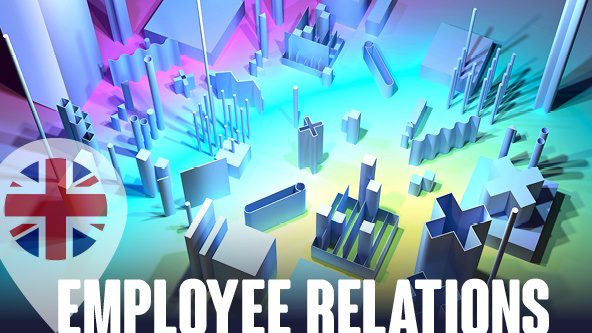Employee Experience and High-Performance Culture
HRD Briefing 2022: Employee Voice and Activism – Why Is It on the Rise?

In February of this year, Bill Michael, the UK Chair of KPMG, told staff at a Town Hall meeting who had raised their concerns about the impact of the pandemic on their earnings and job security that they should ‘stop moaning’ before going on to voice his doubts about the value of unconscious bias training. Despite a rapid retraction and apology, he stepped down as UK Chair a few days later saying he felt his position had become ‘untenable’. In another instance of management miscalculation, Jason Fried, the CEO of tech startup Basecamp, announced a new policy at the beginning of May banning ‘societal and political discussions’ from the company’s internal chat forums. While Fried’s intention was to stop a growing conflict between management and employees over systematic racism, by the end of May more than a third of the company’s employees had resigned despite a rapid apology from Fried.
While these situations happened on different continents and in different companies, they are a symptom of an accelerating trend in work organisations: the increasing prevalence of employees speaking up and engaging in political debate and activism at work. Employees are demanding to be heard, they are asking hard questions, and they are protesting loudly when they don’t like the answers they hear. And this has moved far beyond familiar issues like pay and promotions to new and emotionally charged topics like racism, climate change, and abortion. The idea that politics should be kept out of the workplace is dying, if not already dead, and firms and their leaders need to be ready for this change or face the consequences.
Underlying this growing challenge is the increasingly polarised and uncivil nature of public debate. This is, of course, a trend that has been developing over the last several decades. There are multiple reasons for this. First, individuals are losing their identification with the traditional left/right distinctions in politics and their ties to the associated political allegiances. As a result, they are losing the sense that a political party, and a political leader, speaks for them. This has largely been replaced by single-issue politics where topics like climate change, abortion, and vaccination become core issues where there is little middle ground or room to compromise.
Second, these positions are increasingly not simply matters of opinion but are becoming a core part of the identities of individuals. Where once these issues where part of larger ideologies, now individuals are ‘pro-choice’ or ‘pro-life’; ‘pro-vaccine’ or ‘anti-vax’; ‘black lives matter’ or ‘all lives matter’. The historical political leanings to right and left no longer mean much to a growing number of people and instead they focus on one or a few of these issues that become core to the identities of both the individuals themselves and those with whom they disagree. The resulting calculus is simple: people who agree with me are good, those that do not are bad.
Third, and perhaps unsurprisingly, this has led to an increasing lack of civility in public discussion at a societal level that spills over into corporate discussions. Political leaders in many countries have pushed the boundaries of ‘civil discourse’ and brought large parts of the public with them. This trend is worsened by social media and the seemingly ever more conflictual and violent (not to mention fact-free) nature of much of the discussion that happens on digital platforms like Facebook, Twitter, and YouTube. As a result, the uncivil is increasingly accepted as normal and the boundaries of what is acceptable in public discussion keep being pushed ever further.
So, what does this mean for HR Directors and the top management teams of which they are a part? How can senior leaders avoid the missteps of Bill Michael and Josh Fried? There are several things that HR Directors can do right now:
- Work to develop top management sensitivity to the changes that are underway. This can be done through the discussion of real cases where things went wrong in other companies and by making sure that this topic is on the agenda in management discussions throughout the firm.
- Once leaders are engaged and thinking about this topic, executive education programmes for managers should include discussions of this as a standard part of effectively managing communication within the firm. The new sessions should focus on what topics are most likely to go wrong and why uncivil conversations happen when these topics are badly handled.
- Create an employee voice and activism crisis team that is available to respond when these situations begin to develop. Many companies have a crisis management team focused on external crises but have nothing in place to support top management when one of these issues arises inside the firm. Creating a team with the right mix of PR and HR skills and knowledge to take on these problems when they occur can save precious time when an internal crisis is brewing.
- Ensure channels exist for employees to raise questions and concerns and for proper answers to be provided. As the experience of Josh Fried shows, it is better to be on top of and able to manage discussions than for them to be going on without management involvement and leadership. Good practice in these cases is to encourage discussion, but to manage it to ensure people feel heard so that uncivil conversations never occur.
Finally, and most importantly, senior management needs to lead on these issues and not simply react. Leaders needs to model good practice in listening but also must also proactively raise issues before they are raised by employees. This means that there should be no ‘elephants in the room’ that no one can talk about. Instead, leaders need to have the courage to raise these issues appropriately and make sure that positive and well-crafted positions are taken and clearly communicated. At the same time, there are no simple answers and leaders everywhere are finding their way in terms of dealing with this new challenge. What is clear, is that employee voice and activism on difficult political issues are now a fact of life in work organisations and ignoring them or trying to stop them is not a solution.
This article formed part of the HR Directors’ Briefing: Scanning the Horizon: Trends and Issues in 2022. View the full Briefing here.




